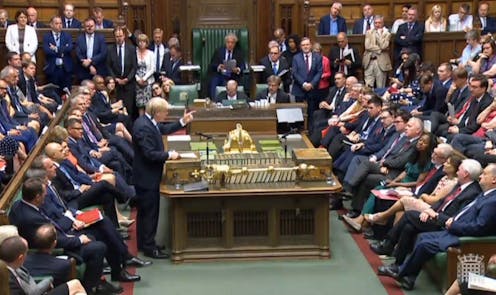
The word prorogation is on everybody’s lips in the UK. The Queen has accepted Boris Johnson’s request to suspend parliament for over a month. It is the prime minister’s boldest gambit to date. Can MPs fight back in September?
Parliament returns on September 3. Prorogation is due to commence in the second week of September, and terminates on October 14. MPs face narrow operating windows on either side of the suspension period. And a no-deal Brexit is the default outcome on October 31.
Parliament is typically divided into yearly working periods or sessions. Prorogation is the means of bringing a session to an end, and in normal circumstances it is a formality. During prorogation, parliamentary business – including scrutiny of the government – ceases.
The government stands accused of weaponising this mechanism for partisan political reasons, given the timing and duration. This prorogation is timed at a key period in the run-up to October 31 – the day the UK is scheduled to leave the EU, with or without a Brexit deal. The government is also aware that opposition parties are openly planning to challenge its approach to Brexit using legislation first and a possible confidence motion second.
To fight back, MPs will need to act as soon as parliament returns on September 3. They can either try to pass legislation that forces the government to do parliament’s bidding or topple the government via a confidence motion.
Drafting legislation to stop Johnson
Legislation is an option but it won’t be easy. There are significant procedural challenges. MPs will need the cooperation of the speaker since the government normally controls House of Commons business.
If MPs did get a bill on the agenda, it could be expedited through the Commons in one day – and there are many examples of this happening. The House of Lords could be an obstacle to expedience, though. Peers could filibuster to use up the vanishingly brief September window. The bill will die if it does not pass through the Lords and receive Royal Assent before prorogation commences.
MPs must also make some difficult but critical decisions about what they are aiming to achieve with their bill. One textually modest (but politically contentious) option would be to pass legislation requiring an election before October 31. This latest legislation would take precedence over the existing election provisions under the Fixed-term Parliaments Act 2011.
Of course, time would need to be cleared for an October campaign and the election’s outcome would be uncertain. There is a risk that, in the event of a hung parliament, Johnson as incumbent PM may seek to linger in Downing Street and run down the clock. But at this stage, this may be a gamble MPs are ready to take.
Another modest option would be a limited anti-prorogation measure. The bill could require the government to revoke its advice about prorogation to the Queen.
A big, bold Brexit bill … in record time
A bolder legislative strategy is also possible in September. Instead of, or alongside, the more modest options, MPs could try to address head-on the broader challenge of averting a no-deal Brexit.
MPs could legislate to force the government to seek an Article 50 extension. The Commons last did this in April by taking control of business to push through the Cooper-Letwin Bill. But that bill was not tightly drafted. It would not have blocked a no-deal Brexit, and many scenarios were left unaddressed. It was never tested because Theresa May decided to seek an extension before the bill was passed. MPs will not be so lucky with Johnson. Any proposed text would need to be legally watertight – and yet the truncated timeframe and precarious political conditions militate against this.
While united against no deal, MPs have repeatedly shown that they are divided on other aspects of Brexit. If they are to produce a watertight bill, they must quickly overcome their disagreements and reach a decision on all kinds of tricky questions. Should the bill, for example, force the government to revoke the Article 50 notice if the EU rejects an extension? Should the government be forced to accept any EU counterproposal, whatever its content?
Toppling the government
Toppling the government is an even tougher option. A confidence motion must be tabled under the Fixed-term Parliaments Act 2011. If it passes, a 14-day window is triggered during which a viable alternative administration is sought. If that fails, an election must take place on a day chosen by the prime minister.
The difficulty, again, is time. Johnson’s suspension has suffocated the threatened confidence vote. The September window is so brief that MPs cannot make use of the full 14 days. Even if a motion passes, and a viable alternative administration makes itself immediately known, Johnson as incumbent prime minister might refuse to step down. He would only need to hold out until Monday September 9, at which point the suspension could commence.
The post-October 14 window is also short. And prorogation is extendable. The government can compress the October window further. It might even deploy legal arguments to extend the suspension beyond October 31. That would leave MPs without a second chance, and only underline how the ragged seams of the British constitution are being ruthlessly exposed by Brexit.
Asif Hameed does not work for, consult, own shares in or receive funding from any company or organisation that would benefit from this article, and has disclosed no relevant affiliations beyond their academic appointment.
This article was originally published on The Conversation. Read the original article.







